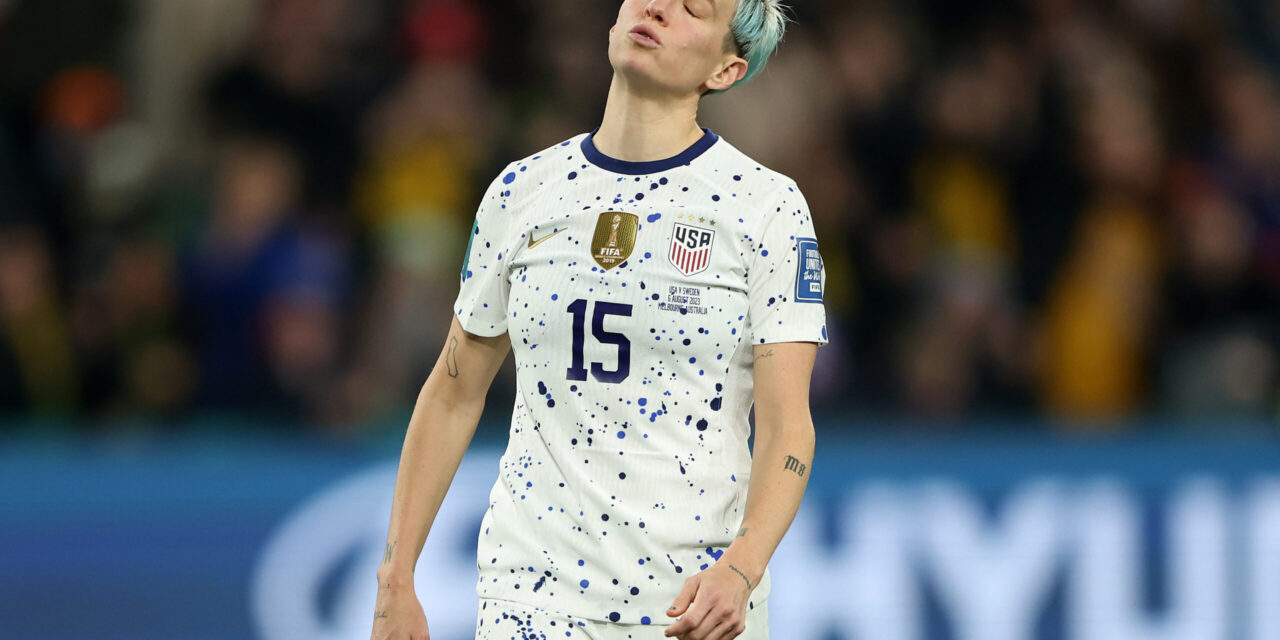Like a normal American, I was rooting for the American team in the 2023 Women’s World Cup and was sad and disappointed when they lost to Sweden on penalty kicks over the weekend and were eliminated from the tournament. Overall, the team had preformed far below expectations in New Zealand during the opening phase, managing two draws and a lackluster 3-0 win over lowly-ranked Vietnam. It was good enough to advance to the knockout phase in Melbourne, Australia, but a second place finish in their group meant a tougher matchup going forward. Sweden is ranked third in the world. Nonetheless, the American women outplayed Sweden, dominating for 120 minutes. Only a heroic effort by the Swedish keeper kept the game scoreless. And then several American players choked on their penalty kicks and the chance to win a third straight World Cup was over.
Their loss was widely celebrated by the American right, which seems unpatriotic to me, but even many fans are blaming the team for this response, including commentator and former men’s World Cup player Alexei Lalas.
Don’t kill the messenger. This #USWNT is polarizing. Politics, causes, stances, & behavior have made this team unlikeable to a portion of America. This team has built its brand and has derived its power from being the best/winning. If that goes away they risk becoming irrelevant. https://t.co/J5yFxOuBet
— Alexi Lalas (@AlexiLalas) August 6, 2023
I don’t dispute that the women’s wildly successful past is the primary reason that women’s soccer in America has boomed in popularity, nor that domestic interest in the sport, and the conclusion of this year’s World Cup, will take a bit of a hit without the national team in the tournament. But I think “irrelevancy” is taking things several steps too far.
I think women’s soccer has arrived in America and the domestic pro league is growing and will continue to build an audience. Another World Cup championship would certainly have been helpful in that respect, but the foundation has been built and will survive this setback. For the foreseeable future, America will be considered one of the top teams in the world, and little girls will aspire to one day represent the country in international tournaments.
It’s true that some American players have been outspoken politically, which naturally will alienate half the country, but soccer as a sport is anti-racist and anti-fascist, so this isn’t off brand at all, nor is it inconsistent with the values the sport’s organizing bodies want to send. For example, when U.S. World Cup star Megan Rapinoe knelt during the national anthem, U.S. Soccer issued a new statement and policy:
U.S. Soccer affirms Black Lives Matter, and we support the fight against racial injustices.
U.S. Soccer Board of Directors voted to repeal Policy 604-1, which required our players to stand during the national anthem. The policy was put in place after Megan Rapinoe kneeled in solidarity with the peaceful protest inspired by Colin Kaepernick, who was protesting police brutality, and the systematic oppression of Black people and people of color in America. It has become clear that this policy was wrong and detracted from the important message of Black Lives Matter.
We have not done enough to listen – especially to our players – to understand and acknowledge the very real and meaningful experiences of Black and other minority communities in our country. We apologize to our players – especially our Black players – staff, fans, and all who support eradicating racism. Sports are a powerful platform for good, and we have not used our platform as effectively as we should have. We can do more on these specific issues and we will.
It should be, and will be going forward, up to our players to determine how they can best use their platforms to fight all forms of racism, discrimination, and inequality. We are here for our players and are ready to support them in elevating their efforts to achieve social justice. We cannot change the past, but we can make a difference in the future. We are committed to this change effort, and we will be implementing supporting actions in the near future.
In my book, when all the scores are tallied, the anti-racists and anti-fascists are never irrelevant, and if taking this kind of stand means half the country won’t support the team, that’s a problem with our country, not the team.







